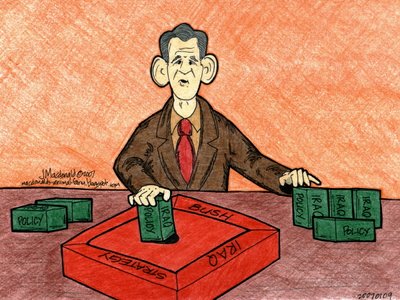Defined Insanity

The chance that Bush is going to lay out some new strategy on Iraq is slim and none in my estimation. With each passing year (this being the
Of course, the similarities are even greater now than when I first penned my essay, or for those Bush apologists, penned my skreed. The latest similarity to add to the list is the politicians, in this case Bush had decided to run the war as he sees fit over the objection of the commanders on the battlefield. (Politicians micro-managing the war from Washington DC.) And to think, Bush said he was leaving decisions like increases in troops to the commanders in the field.
One last thought regarding It is not another Vietnam; it is Bush’s Vietnam (the title of the essay) and it has to do with the troop casualties. If not for the improvements in medical technology since the Vietnam War, it is my belief that the number of dead US service personnel would rival the number of dead, in a war where the lessons taught have been long forgotten.
It is not another Vietnam; it is Bush’s Vietnam
04/14/2004
Last week on the floor of the Senate, Arizona Senator John McCain (R) argued that the war in Iraq is not Vietnam. I would concur that Iraq is not Vietnam. I also agree with the recent statement made by Massachusetts Senator Ted Kennedy (D) that “Iraq has become George Bush’s Vietnam.”
And here’s why.
When comparing Vietnam to that of Iraq some distinct similarities arise between the two wars. To begin with both conflicts were started under false pretenses. In Vietnam there was the Gulf of Tonkin. In Iraq, there was the threat that Saddam Hussein possessed “weapons of mass destruction.” Prior to each war, presidents Lyndon B. Johnson and George W. Bush went before a joint session of congress, armed with artificial evidence and came away in both cases with congress abdicating it’s constitutional roll to declare war by citing the War Power’s Act.
Both wars demonstrate(d) that the U.S. Military possesses superior training and a technological advantage that the enemy cannot hope to overcome. While it has yet to be demonstrated in Iraq, in Vietnam the lack of superior weapons did not inhibit the North Vietnamese who relied upon guerilla tactics and co-mingling with local civilian populations. Likewise in Iraq, the use of guerilla tactics and the co-mingling with local civilian populations is blamed for the all to frequent deaths of civilians.
Like our involvement with Iraq, as with Vietnam, failure is (was) not an option. The U.S. government through the citizens and consequently the U.S. military, the nation must refuse to look weak. During Vietnam and now with Iraq, supporters of the war would often accuse those opposed to the government’s actions as “anti-American” or worse aiding the enemy.
To “appear weak” would hasten our nation’s “failure” and consequently “the spread of communism” in South East Asia euphemistically referred to as “the domino theory.” Today, the war in Iraq presents the country (and the world) with a twist to the domino theory. Today, appearing weak and any subsequent failure would prevent the spreading of democracy in the Middle East.
Most recently it has been reported that recently trained Iraqi soldiers refused to fight against Iraqi insurgents questions the loyalty the Iraqi’s have to the United States. As in Vietnam, the issues of loyalty challenged the notion that the U.S. is “winning the hearts and minds” of the Vietnamese/Iraqi civilian population for whom U.S. soldiers are supposedly dying for.
Bush, like Johnson braced the nation for the continuation of hostilities. Each president in turn has warned the civilian population about the need to increase the numbers of troops. With an increase in the numbers of soldiers serving in Iraq (as with Vietnam) will bring with it an increase in the number of wounded and dead.
Is it any wonder that we read and hear how Iraq has or is becoming another quagmire? As the Vietnam War stretched out over time it became clear that the Johnson administration had no exit strategy for Vietnam. Similarly, the Bush administration has no exit strategy for Iraq.
During the Vietnam War it was often argued that the politicians limited the effectiveness of the war effort. In the early stages of the war in Iraq saw members of the administration scoffing at the assertions of General Eric Shinseki regarding the number of troops needed in fighting the war in Iraq.
Of all the similarities shared between Johnson’s Vietnam and Bush’s Vietnam for what it is worth both presidents hailed from the state of Texas. There is the potential for one more share connection between these two men, these two wars, that is too be determined in the November 2004 election. So we wait…
In these last few lines of similarities I am reminded of the saying about ‘those who have forgotten the past are doomed to repeat it.’ The war in Iraq demonstrates that the nation as a whole has forgotten the past and has failed to learn and remember the lessons that Vietnam had supposedly taught us.



1 Comments:
Welcome back, Mac!
Post a Comment
<< Home